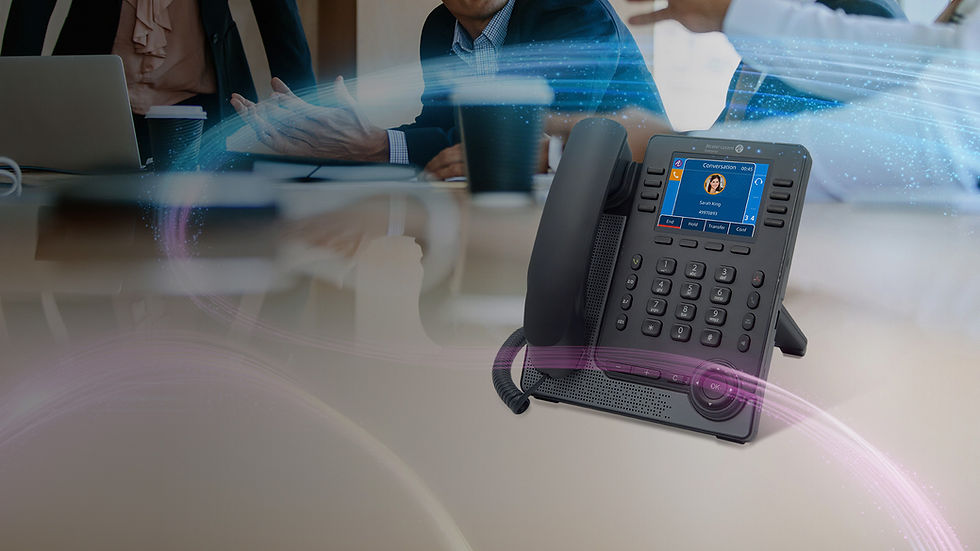What is a SIP Phone and how does it work?
- Admin ICTRC

- May 1, 2025
- 3 min read
Updated: Jun 2, 2025

Still struggling with getting smooth phone calls through your traditional landline phone?
In this fast-paced era where speed, clarity and flexibility are crucial to business success, outdated phone systems can hold your company back. If you're still using traditional landlines or bulky PBX setups, it's time to consider a smarter, more modern solution: SIP phones.
But what exactly is a SIP phone? And how does it work?
Whether you're a growing business, a remote team, or an enterprise looking to cut communication costs, this guide will walk you through the essentials of SIP phone systems and why they’re becoming the new business standard.
What is a SIP Phone?
SIP stands for Session Initiation Protocol, this is where a signalling protocol is used to initiate, maintain, and terminate voice, video and messaging sessions over the internet. Basically, a SIP phone uses to internet to make calls instead of going through a landline.
There are two main types of SIP phones:
Software-based SIP phones (softphones): Apps installed on computers, tablets, or smartphones.
Hardware-based SIP phones: Physical desk phones that connect via Ethernet and function just like traditional phones—but with advanced capabilities.
SIP phones are a core component of VoIP (Voice over Internet Protocol) systems and are now replacing traditional PBX (Private Branch Exchange) systems in modern businesses.
So, how do SIP phones work?
Think of SIP phones as the internet-era version of traditional phones, but far more powerful. Here’s how they work:
Call Initiation: When you dial a number, your SIP phone sends a request through your internet connection.
Session Management: The SIP protocol manages the connection between you and the person you're calling—setting up the session, maintaining it, and eventually ending it.
Call Termination: When the call ends, the SIP protocol closes the session cleanly.
However, SIP does not carry the audio itself, it uses another protocol called RTP (Real-Time Protocol), but SIP acts like the traffic controller, ensuring you get your call as requested with no hitches.
Bonus Tip: SIP phones work not just for voice calls, but also video conferencing, instant messaging, and file transfers, depending on your provider and setup.
Key Features of SIP Phones
SIP phones offer a wide range of features that go far beyond what traditional systems can deliver:
🔊 HD voice quality for crystal-clear conversations
🔁 Call routing and forwarding for seamless availability
📧 Voicemail-to-email functionality
🎛️ Auto-attendants (IVR) to professionally manage incoming calls
🔗 Integration with CRMs, collaboration tools, and email platforms
📈 Scalability, perfect for growing teams or remote workers
These features make SIP phones especially valuable for customer service teams, sales departments, and fast-paced industries.
But why are businesses switching to SIP phones?
Businesses across industries are embracing SIP phones for several good reasons:
💸 Cost Savings
Say goodbye to expensive line rentals and long-distance charges. SIP calls are transmitted via the internet, making them significantly cheaper—especially for international communication.
🌎 Flexibility
Need to scale your phone system quickly or enable remote work? SIP phones can be set up anywhere with an internet connection, making them ideal for hybrid or distributed teams.
⚙️ Easy Management
No more dealing with clunky hardware or costly upgrades. SIP systems are managed digitally, often through user-friendly dashboards.
💼 Professionalism
With features like auto-attendants and call queues, even small teams can offer enterprise-level call experiences.
Who Uses SIP Phones?
SIP phones are widely used in:
Call centres that need scalable, multi-agent support
Remote or hybrid teams looking for flexible communication tools
Small businesses that want big-business features without the cost
IT departments who want simpler, centralized control over communications
Is SIP Right for Your Business?
Here are five signs your business is ready for SIP phones:
✅ You experience dropped calls or poor call quality
✅ You're spending too much on traditional phone services
✅ Your team works remotely or across multiple locations
✅ You need advanced features like call routing or voicemail-to-email
✅ You want a scalable, modern communication solution
If any of these sound familiar, SIP could be a game-changer for your business.
Conclusion
SIP phones are revolutionizing business communication—offering cost savings, flexibility, and a suite of features that empower teams to communicate better and work smarter. Whether you're a startup or an established company, making the switch to SIP is a smart move.
👉 Ready to upgrade your communication system?
Send us a message through this link: https://www.maxict.com.my/contact-us





Comments